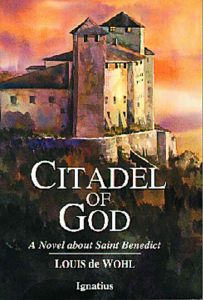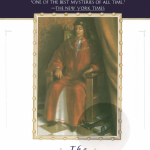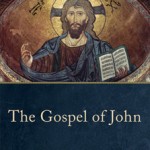 Louis de Wohl spent a considerable time in the middle of the 20th century writing historical novels about the great saints of the Catholic Church. I’ve read a number of them, and have found them to be uniformly well-written, entertaining, and informative. I wouldn’t call them truly top-notch—they are a little lightweight compared to the historical novels I’m seeing these days, and they are certainly romanticized—but as a first look at one of the great saints, they aren’t bad.
Louis de Wohl spent a considerable time in the middle of the 20th century writing historical novels about the great saints of the Catholic Church. I’ve read a number of them, and have found them to be uniformly well-written, entertaining, and informative. I wouldn’t call them truly top-notch—they are a little lightweight compared to the historical novels I’m seeing these days, and they are certainly romanticized—but as a first look at one of the great saints, they aren’t bad.
One thing they aren’t is formulaic, and that’s due largely, I think, to the wildly different amounts of biographical information we have for different saints. The Restless Flame, for example, de Wohl’s novel about St. Augustine of Hippo, presents an intimate and detailed portrait of the saint’s life, precisely because St. Augustine left us his Confessions. With others, like St. Benedict, there’s a fair amount of detail but not enough to stretch to book length without applying a significant amount of imagination. And here de Wohl is consistent: he prefers not to apply his imagination to the life of the saint him or herself, but to the people in the vicinity.
The Citadel Of God concerned St. Benedict of Nursia, the father of western monasticism. De Wohl places the young Benedict in Rome, as a scholar on the periphery of the social circle of Senator Boethius. Boethius and his wife have adopted an orphan, Peter, now a young teen; and briefly hire Benedict to tutor him. And where Benedict will turn from Rome and the world and become a hermit, Peter will cynically seek worldly power and influence. We see Boethius first used and then discarded by King Theodoric of Rome; we see Peter intriguing in Rome on behalf of soon-to-be-Emperor Justinian; and through it all we see Benedict pursuing his quiet path through the storms of the world to build his Citadel of God atop Monte Cassino.
Who will triumph, Benedict or Peter? Benedict, of course; but Peter’s path is not without interest, or redemption.
This was my second reading of this book, and I enjoyed it; if I have a complaint, it’s that it’s too short. We see highlights from Boethius’ career as intermediary between the Goths and the people of Rome; I’d have known more of it. We hear Peter’s highly colored accounts of his time in Constantinople; I’d gladly have seen them directly. And finally, we see highlights of Benedict’s progress in building the monastery on Monte Cassino, and a few details about his first monks; and I’d have gladly spent more time there. But always leave them wanting more, they say; and anyway, I can always go re-read In This House of Brede.











